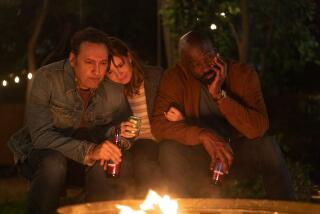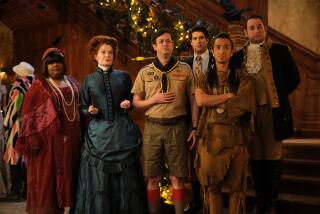Where the haunted meets the hunted
“Afterlife,” which gets its domestic premiere Thursday night on BBC America, is an I-see-dead-people dramatic series that will necessarily beg comparison to our own ongoing “Medium” and “Ghost Whisperer.” One thing to say about it is that, unlike the American shows, there was no one involved in its creation who styles him or herself an authentic medium, and this may have something to do with its darker and less “spiritual” tone. There is the usual business of trying to quiet unquiet souls, both dead and alive, but less interest in the feel-good payoff, as ghosts go gently into that good light.
And it does not star a beautiful young Hollywood actress, but rather the resolutely ordinary Lesley Sharp (“Vera Drake,” “The Full Monty”). Though only four years older than “Medium’s” Patricia Arquette, Sharp is allowed to look a little haggard -- hair stringy, mascara laid on thick as if to hide a lack of sleep -- like the haunted woman she is.
Although the ongoing tension of the series is embedded in the believer/skeptic dialectic between reluctant psychic Alison Mundy (Sharp) and scholarly Robert Bridge (Andrew Lincoln), a university lecturer in psychology who is thrown together with Alison via one of his students, it’s clear we’re supposed to take her side -- not least because she’s much nicer than he is, humble where he’s a little bit arrogant. (That is to say, he thinks he knows something.) The possible argument that, when a spirit appears on-screen or things fly around a room, we are only being shown what Alison thinks she sees falls apart by the end of the second episode, when a ghost goes off on its own to get some business done.
In any case, it’s the usual thing in such stories to side with the believers, faith being sentimentally held as superior to reason, the heart more reliable than the head. (You will not see any TV specials this Christmas season about a little boy who is happy to no longer believe in Santa Claus.) There’s no uplift at all unless Alison’s for real, and in a show this continually and persuasively dark, you do need a little uplift. And if the ghosts aren’t real, what’s there to be scared of?
Though I am no believer in such things, knock wood, I am happy to suspend disbelief for the sake of a little entertainment, and “Afterlife” is both splendidly suspenseful and emotionally true (if it does fall down a little on what the police are likely to do when a strange woman seems to know too much about a dead girl). Sharp’s quietly pained performance is perfectly modulated and the whole show has been made with the fine sense of detail and place and the ever-immanent British weather, and with the richly imagined secondary and even tertiary characters who are hallmarks of the best UK TV.
Still, as one who finds the world too much ruled by magic and superstition, I am, on the face of it, better made for “The Eleventh Hour,” a series of four “scientific” thrillers premiering Monday, also on BBC America. The fact that it stars Patrick Stewart, of “Star Trek: The Next Generation” and the “X-Men” franchise (of course you knew that), alongside Ashley Jensen, of “Extras” and “Ugly Betty,” also whets the whistle. But after a promising opening, it goes steadily downhill, from remotely plausible to completely ridiculous.
There are traces of Capt. Picard and Professor X in Stewart’s Ian Hood, a retired physics professor and walking encyclopedia, who has been engaged by the government to investigate and curb instances of Science Gone Too Far. (Science, being inherently neither good nor bad, can of course go either way.) Because Hood tells the inconvenient truth about things in which large corporations and, indeed, whole nations have a vested interest, he’s a dangerous man and, therefore, a man in danger. (He has his own personal threat level.) To keep him in one piece, then, he has been assigned a Special Branch keeper, spunky Rachel Young (Jensen), and they roam about the country keeping the population safe from the excesses of human knowledge.
At 66, Stewart is in good trim, and remains a credible action hero, though he is not required especially to exert himself. (That’s what Jensen is for.) Having gone bald young, he looks substantially the same as he did back when he was ordering Jonathan Frakes to “make it so,” and here as there, he creates excitement just by centering his voice a little lower in the diaphragm and upping the volume a little.
The first two episodes (about human cloning and a hybrid pox), written by creator and “Doctor Who” vet Stephen Gallagher -- who left the project thereafter -- are by far the better and are worth watching. The premise is sound, and Stewart and Jensen, who have the coincidental distinction of having also played together in an episode of “Extras,” make a lively team: him, old but restless and lively; her, young and spunky but professionally careful; and each capable of annoying the other in a way that makes you want it to go on. But the show is already dead in Britain, where it aired at the beginning of the year -- like the spirits in “Afterlife,” it is a visitor from beyond the veil.
*
‘The Eleventh Hour’
Where: BBC America
When: 10 p.m. Monday
Rating: TV-14 (may be unsuitable for children under the age of 14)
---
‘Afterlife’
Where: BBC America
When: 10 p.m. Thursday
Rating: TV-14 (may be unsuitable for children under the age of 14)
More to Read
The complete guide to home viewing
Get Screen Gab for everything about the TV shows and streaming movies everyone’s talking about.
You may occasionally receive promotional content from the Los Angeles Times.







